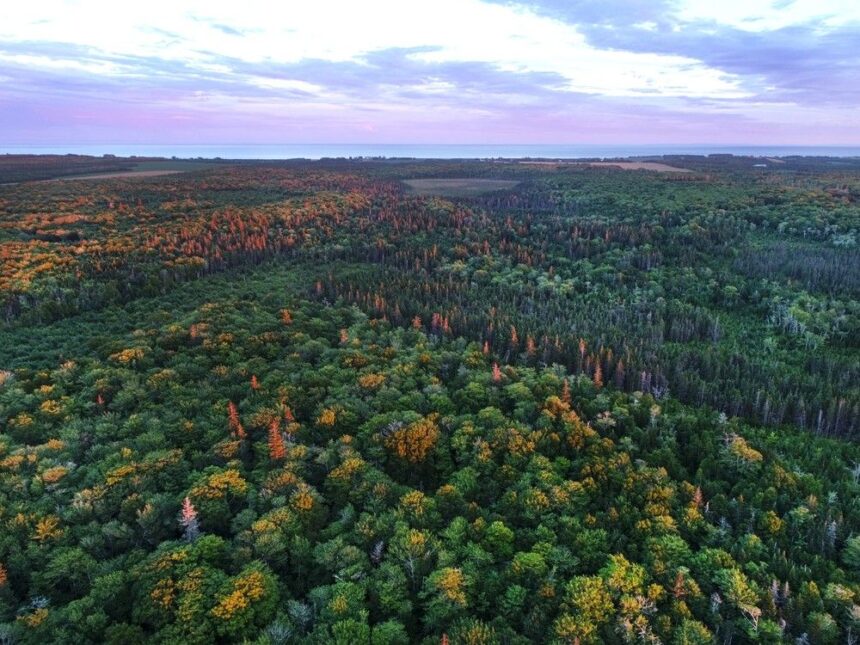Published Apr 22, 2025 • 2 minute readKingsboro, P.E.I., is the site of a Nature Conservancy of Canada project. Photo by Mike Dembeck /Nature Conservancy of CanadaOn this Earth Week, the significance of forests for conservation, community benefits and human health has never been more urgent to acknowledge.Forests play many critical roles for nature and people: they provide habitat for hundreds of species, act as water filters, reduce air pollution, and are places of community connection, recreation and refuge. They regulate temperature and weather patterns, and remove carbon dioxide from the atmosphere.THIS CONTENT IS RESERVED FOR SUBSCRIBERS ONLY.Subscribe now to access this story and more:Unlimited access to the website and appExclusive access to premium content, newsletters and podcastsFull access to the e-Edition app, an electronic replica of the print edition that you can share, download and comment onEnjoy insights and behind-the-scenes analysis from our award-winning journalistsSupport local journalists and the next generation of journalistsSUBSCRIBE TO UNLOCK MORE ARTICLES.Subscribe or sign in to your account to continue your reading experience.Unlimited access to the website and appExclusive access to premium content, newsletters and podcastsFull access to the e-Edition app, an electronic replica of the print edition that you can share, download and comment onEnjoy insights and behind-the-scenes analysis from our award-winning journalistsSupport local journalists and the next generation of journalistsRegister to unlock more articles.Create an account or sign in to continue your reading experience.Access additional stories every monthShare your thoughts and join the conversation in our commenting communityGet email updates from your favourite authorsSign In or Create an AccountorArticle contentHowever, many pressures, including severe storms and wildfires, invasive alien species and habitat loss, threaten these ecosystems, the benefits they provide and the relationships they support. When our woodlands are compromised, so too is the quality of the air we breathe and the water we depend on. The well-being of every Canadian, from the bustling urban centre to the most remote rural town, is at stake.Among most forestedCanada’s forests make up nearly one-tenth of the world’s total. We are one of the most forested countries in the world, ranking ahead of the United States and just behind Russia and Brazil. Our country boasts connected, intact forest habitats and significant terrestrial carbon stores. With around 140 native tree species, Canada has a unique role and collective duty to protect these areas.One-third of the 426 bird species that breed in Canada rely on forests for survival. Canada’s northern forests provide nesting habitat for an abundance of diverse migratory birds that winter in the U.S., Central America and beyond. From tiny warblers to large swans, it’s estimated that between three and five million birds migrate south from Canada’s boreal forest every fall.Article contentThe economic value of our forests is just as vital as their ecological importance. According to the Forest Products Association of Canada (fpac.ca), more than 200,000 Canadians earn their livelihood directly from forestry, sustainable agriculture and eco-tourism, contributing an impressive $87 billion in annual revenue.Nature Conservancy goalsSince 1962, the Nature Conservancy of Canada (NCC) has championed the cause of forest conservation, safeguarding over 1.6 million hectares of forests — an area more than twice the size of Prince Edward Island. Working in partnership with landowners, corporations, governments and Indigenous Nations, these special places deliver economic, community and health benefits.NCC is looking at new and exciting opportunities. With an ambitious goal to conserve an additional one million hectares of nature by 2030, NCC is leading the charge to build a resilient world with nature. Our work is not just about caring for the land; it’s about ensuring that our communities continue to thrive with nature.Article contentWe encourage the private sector, foundations and individuals to join us in investing in forest conservation and restoration efforts. NCC has a track record of bringing together landowners, people and communities. Clean air, clean water, nutritious food, jobs and our overall well-being depend on nature and our forests.The call is clear: protecting Canada’s forests means protecting ourselves. Our natural resiliency, our economic prosperity and our health require us to do our part. As Canadians, we have both the duty and the privilege to safeguard our forests.Let us unite and embrace this challenge with determination and care. Our forests are not just a backdrop to our lives; they are the very essence of our future. Nature makes it possible.Lisa McLaughlin is vice-president of Conservation Policy and Planning with Nature Conservancy of Canada.Article content
COMMENTARY: Roots of tomorrow: Canada’s forests need our support











